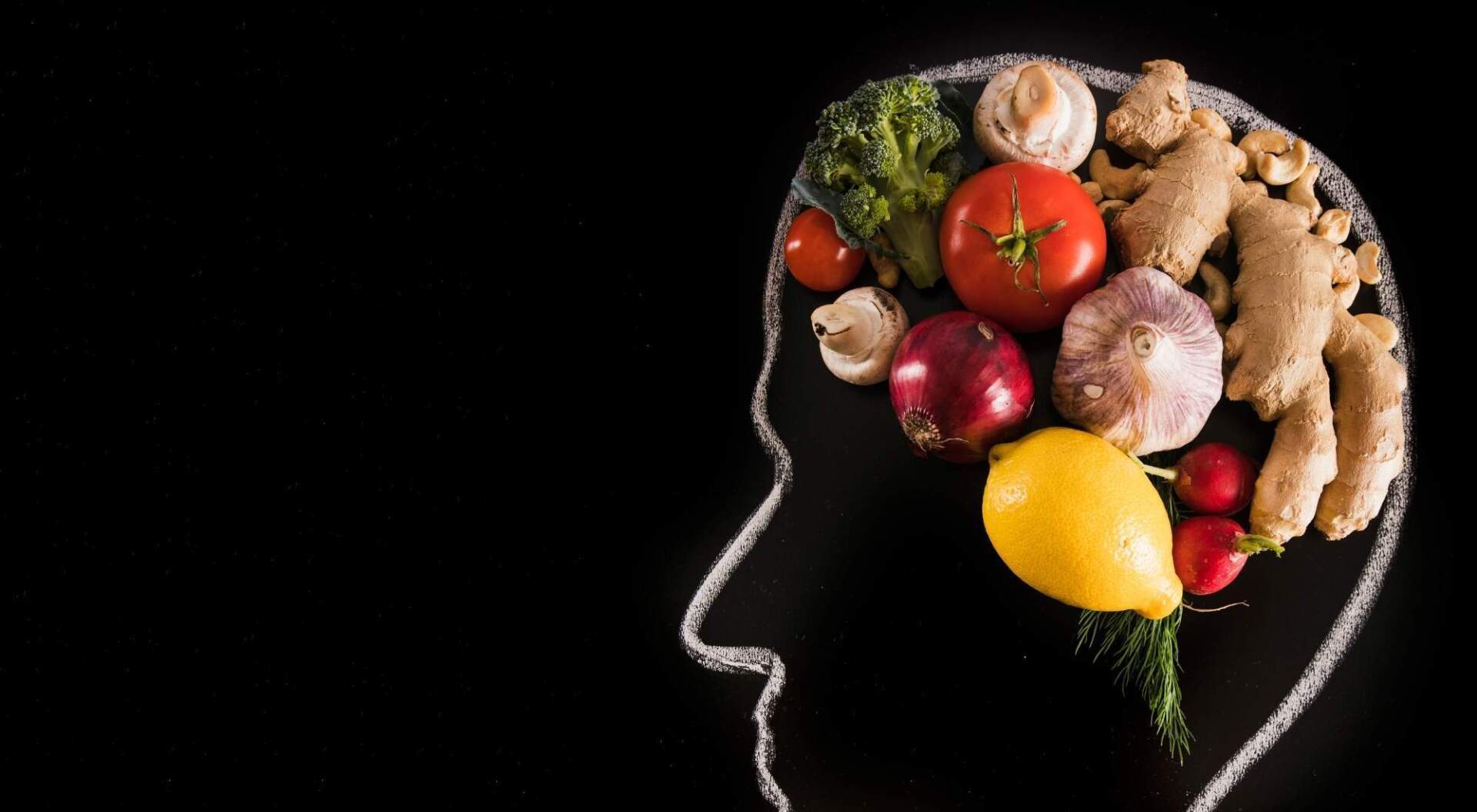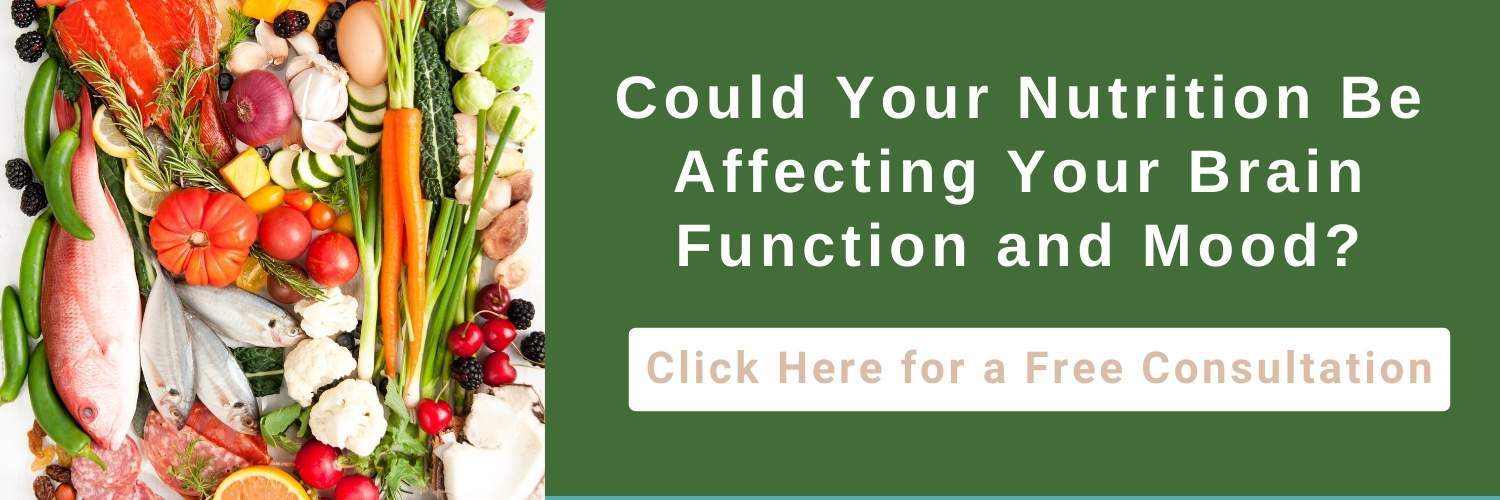Nutrition and Brain Function: How Your Diet Can Affect Your Mood & Cognitive Function
"The content below is not intended to be a substitute for professional medical advice, diagnosis, or treatment. Always seek the advice of your physician or other qualified health provider with any questions you may have regarding a medical condition."
Ever find yourself getting cranky or down in the dumps after hitting the drive-through for lunch?
Or barely being able to keep your eyes open after stuffing your gut at a Sunday buffet?
What do these have in common? Food.
You really are what you eat.
If you struggle with slipping into a “food coma,” brain fog, or crummy moods, you may need to improve your diet.
Keep reading to find out more about how nutrition impacts mood and brain function and what you can do to get back to feeling your very best.
Table of Contents
- Can Nutrition Affect Your Mood and Brain Function?
- How Does Nutrition Impact Brain Function?
- The Effects of Poor Nutrition on Brain Function
- The Effects of Good Nutrition on Brain Function
- Does Nutrition Impact Mood?
- How Does Poor Nutrition Affect Your Mood?
- Nutrition and Brain Function: Foods To Eat To Maintain Brain Health & Improve Your Mood
- Understand How Your Specific Diet Is Affecting Your Mood and Brain Function With the Help of HealthierU
Can Nutrition Affect Your Mood and Brain Function?
Absolutely!
Lack of proper nutrition can have a major impact on your mood and your brain function.
Think about those times you’re really feeling out of it, eat a well-balanced meal, and “poof,” you feel great and can think straight again.
Now think about the times you eat a specific food or meal (or maybe you just eat way too much) and wind up in a full-blown food coma.
For better — or worse — nutrition and brain function go hand-in-hand.
How Does Nutrition Impact Brain Function?
As we work on understanding the correlation between nutrition and brain function, let’s take a look at the impact of gasoline on an automobile. The right octane of gas not only keeps a car moving but also gives it what it needs to operate at peak performance.
Food in your body works exactly the same way. When you consume high-quality foods — ones that contain plenty of vitamins, minerals, and antioxidants — your brain gets flooded with the nourishment it needs.
And it is protected from free radicals. Free radicals are waste products produced by unstable molecules in your body. And they can cause serious damage, including inflammation and disease.
Just like your car can become sluggish if you fill it with cheap gas, your body (and mind) can become sluggish when filled with low-quality foods.
Want to learn more about how to fuel your body so you can feel your very best? HealthierU can help!
Dr. Donna Sergi can help you pinpoint the foods that do — and don’t — work in your body, and she’ll formulate a personalized action plan using healthy foods and natural remedies.
Contact us today for a free consultation.
The Effects of Poor Nutrition on Brain Functionhow-nutrition-impacts-mood-and-brain-function
Your gut and brain are intimately connected.
Your gut senses the nutrients in the food you eat and sends signals to alert your brain. This is referred to as the gut-brain axis and explains why an unhealthy diet can result in issues with brain functions such as the ability to:
- Learn
- Remember; or
- Think
When you consume an unhealthy diet, it causes your body to release excessive stress hormones that can result in inflammation in certain areas of your brain, including your hippocampus.
This inflammation can have a negative effect on your cognitive abilities, which makes it harder to focus, remember, or plan. It can even lead to depression.
Cognitive Decline Is Associated With High Sugar Intake
Studies show consuming large amounts of sugar can lead to diminished brain function.
Sugar causes inflammation in your brain — which can result in memory problems.
A high-sugar diet also reduces brain-derived neurotrophic factor (BDNF), a chemical in your brain that is essential for memory formation and learning. Decreased levels of BDNF are associated with a higher incidence of
Alzheimer’s disease and dementia.
Diets High in Processed Foods & Unhealthy Fats May Impair Memory
You’ll hear it over and over again: highly processed foods wreak havoc on your body.
Eating a diet high in …
- Trans-fatty acids
- Saturated fats; and
- Omega-6 fatty acids
… keeps your brain from being able to effectively process information. Plus, it decreases your brain’s plasticity and makes it harder for your brain to:
- Grow
- Adapt; and
- Learn new skills
Research also shows eating a diet consisting of 25g of processed meat per day
increases your risk of dementia by 44%.
The Effects of Good Nutrition on Brain Function
Science has proven what the natural health world has long suspected: nutrition, brain function, and cognitive performance are all intertwined.
The abundance (or lack) of specific vital nutrients can affect how you think and process information and emotions.
A nutritious, balanced diet floods your body (and brain) with vital:
- Fatty acids
- Antioxidants
- Vitamins; and
- Minerals
Here are a few ways your nutritional intake plays a key role in how your brain functions throughout the day.
Neurogenesis
Neurogenesis is the process that allows new neurons to be formed within your brain.
It has a direct effect on your memory and ability to learn — as well as protecting your brain from breaking down due to the natural
stress of everyday life.
Synaptic Plasticity
What you eat can also affect your brain’s synaptic plasticity.
This refers to your brain’s ability to create strong neural connections over time. It measures the number of connections between your brain's neurons. The more connections there are, the better the neurons communicate, and the better you are able to:
- Think
- Learn; and
- Memorize information
BDNF
Brain-derived neurotrophic factor (BDNF) is a protein that encourages the growth and survival of the neurons in your brain.
BDNF protects neurons from increased neurogenesis and death and improves brain function and overall cognitive abilities.
When you eat a healthy diet, it increases the levels of BDNF in your brain and helps make new connections that can improve your:
- Memory
- Ability to learn
- Mood
- Attention span; and
- Mental health
Does Nutrition Impact Mood?
How Does Poor Nutrition Affect Your Mood?
If you’re not eating a healthy diet, you are not getting the vitamins and minerals your body needs to thrive.
Low levels of …
- Omega-3 fatty acids
- B vitamins
- Zinc
- Iron
- Magnesium; and
- Vitamin D
… can result in low mood and depleted energy.
Eating refined carbohydrates, such as white bread, pasta, and pastries, make your blood sugars rise and then plummet — causing your mood to follow suit.
Not Eating Enough Can Cause Blood Sugar Levels To Drop — Leaving You Feeling Weak and Tired
If you’re feeling exhausted — even though you seem to be getting plenty of sleep — it's probably time to take a close look at your diet.
Many of us feel like we eat enough food, but the reality is we are not eating the kinds of food we need to keep our blood sugar stable. So we are operating at low energy levels.
USDA dietary guidelines tell us:
- Women should eat between 1,600-2,400 calories a day; and
- Men require approximately 2,000-3,000 calories a day
But if you live an extra active lifestyle and exercise regularly, you might need to consume even more.
And remember that the important thing is the quality — not the quantity — of the calories you consume.
If you’re fueling your body with empty calories like those found in …
- Soft drinks
- Cookies
- Chips; and
- Fast food
… you’re depriving your body of the quality calories it needs to fuel your body and keep your blood sugar at a healthy level.
Eating high-quality calories founds in foods such as …
- Protein
- Complex carbohydrates; and
- Healthy fats
… will stabilize your blood sugar, boost your energy levels, and rev up your metabolism.
A Diet That Lacks Proper Vitamins Can Cause Your Mood To Worsen & Energy Levels To Drop
Feeling “hangry” is no joke.
When you don't take the time to eat a vitamin-rich meal, your brain goes into panic mode and can cause your mood and energy levels to take a deep dive.
In fact, studies reveal that low blood sugar levels can cause aggressive, violent behavior.
So when you notice yourself starting to feel grumpy or feel an energy slump, take a minute to think about what you’ve had to eat. If you haven't eaten, or if you've eaten junk all day, you are probably seeing the correlation between the lack of nutrition and brain function.
Grab a healthy snack or prepare a vitamin and mineral-packed meal. This will help you stay on track with your positive mood — and give you the energy you need to make it through the day.
A Diet Full of Unhealthy Carbs or Processed Foods Can Lead to Irritability
What do …
- White bread
- White rice
- Pasta
- Crackers
- Cookies; and
- Soda
… have in common?
They are all loaded with unhealthy carbohydrates — and can lead to irritability and depression.
These foods, along with other highly processed selections, cause your blood sugar to become out of balance and can make it difficult to control your mood and emotions.
So if you're finding yourself getting snippy with your family or co-workers, consider what you're eating.
Think of foods you can eat that fuel your body, and you (and your loved ones) will reap the benefits of your improved mood and stable mental health.
Nutrition and Brain Function: Foods To Eat To Maintain Brain Health & Improve Your Mood
Ready to boost your brain health and improve your mood? Check out these foods for a better brain:
Leafy Greens
Leafy greens are packed with brain-supporting nutrients such as vitamin K and beta-carotene. Try adding these into your diet:
- Kale
- Spinach
- Bok choy; and
- Romaine lettuce
Just be sure to skip the sugary salad dressings!
Fatty Fish
Some fish are loaded with omega-3 fatty acids. These are great for your body because they:
- Improve your mood
- Sharpen your memory; and
- Protect your brain from decline
Try to choose wild-caught fish, such as:
- Salmon
- Trout; and
- Sardines
High-Quality Oils
Skip the processed vegetable and canola oil. Opt instead for high-quality oils like:
- Olive
- Avocado; and
- Coconut
Dark Chocolate
Great news!
Dark chocolate, cacao, and cocoa powder contain powerful antioxidants that are great for improving mood and brain function.
The key here is choosing dark chocolate.
Stay away from processed milk chocolate, white chocolate, and dark chocolate with added sugar.
And don’t overdo it. You’ll only want to eat a few pieces at a time.
Nuts and Seeds
Nuts and seeds are power-packed foods high in alpha-linolenic acid and omega-3s — meaning they're great for improving your memory.
For a healthy snack, grab a handful of:
- Walnuts
- Almonds
- Pistachios
- Pecans
- Pumpkin seeds; and
- Sunflower seeds
Understand How Your Specific Diet Is Affecting Your Mood and Brain Function With the Help of HealthierU
At HealthierU we get it. Keeping your brain healthy and your mood balanced is hard work.
And we understand the relationship between nutrition and brain function.
That’s why we use Nutrition Response Testing to:
- Identify the source of the problem
- Evaluate the way your body is responding to different foods; and
- Determine your body’s specific needs using a healthy diet and natural remedies
We create a unique plan to help your body and mind return to a balanced state.
Contact us today for a free consultation.






